As science and technology grow, so does the amount of data collected.
This increase in data volume calls for data science tools that can be used to analyze and visualize such data. Codio's Essential Data Science in Rand Python courses are designed to help students learn essential data science tools quickly and easily.
Essential Data Science in Python & R key features:
- Integration of Spyder (Python) and RStudio (R): two industry-standard IDEs for data analysis.
- A complete hands-on approach to data analysis: code samples, functions, and explanations are provided every step of the way.
- Fully auto-graded assessments and editable content: feedback and sample solutions are provided immediately, and instructors can modify any part of an assessment or lesson.
- Creation of data visualization models: students learn how to create all of the most commonly used charts in data science, from bar charts to heat maps.
- Implementation of image similarity algorithm: instructors can easily grade students' visualization models based on a similarity percentage.
The State of Data Science
The field of data science, as well as related topics like data science and machine learning, have become hot topics in recent years. Data analytics and similar fields continue to be a major point of interest when it comes to career paths. Towards Data Science estimates that the field will continue to grow by about 28% through the year 2026.
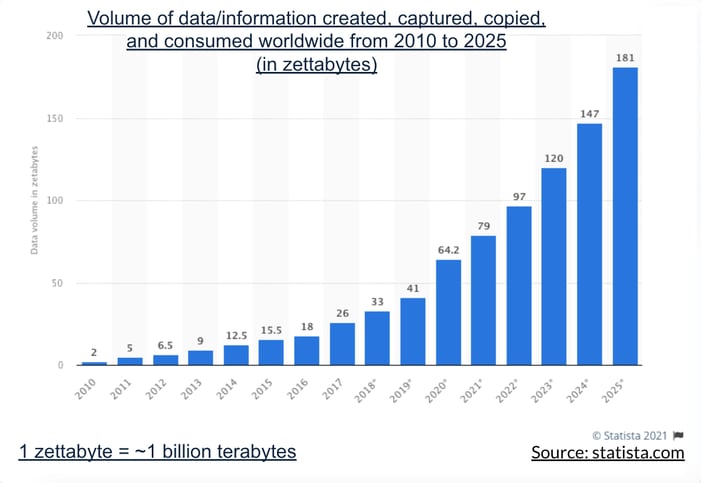
What makes data science such a popular discipline?
To put it simply, mankind continues to produce ever-larger amounts of data.
Statista estimated that, by 2025, we would create, capture, copy, and consume a total of 181 zettabytes of data.
One zettabyte of data is approximately one billion terabytes of data. Today, an average computer is sold with about one terabyte of memory. We would need 181 billion average computers to store this massive amount of data.
Unfortunately, the supply of data scientists and analysts pales compared to the vast amount of data we have. There just aren't enough professionals proficient in data science to try and make sense of all this data.
This lack of supply of data scientists and analysts may be attributed to the scarcity of course offerings at the university or college level.
A majority of those in data analyst and and scientist roles are career changers from other fields of study, such as business, and psychology. Most of them are self-taught or go through training boot camps to acquire their knowledge and skills.
Effective and engaging R and Python course options and supporting tools are crucial for addressing this talent gap and empowering learner success.
Codio's Unique Approach to Learning Essential Data Science
At Codio, we understand that learning things well is an obstacle, especially for students entering a new field. Thus, we try to ease students into data science, machine learning models, considerations of artificial intelligence, statistical analysis, and many other concepts through a step-by-step and completely hands-on approach.
Codio's Essential Data Science in Python and Essential Data Science in R is suitable for all students, regardless of their programming background.
Students learn applicable data science concepts directly within the Codio platform. They do so using today's most popular and standard data science tools (Spyder and RStudio). Students gain access to these tools with just a click of a button.
There’s no need to configure any of their settings or worry about installing any additional software. Learners can quickly begin using this Python and R Data Science platform.
Which is More in Demand, R or Python?
When it comes to learning data science, you can't go wrong with Python or R. Both are powerful and effective programming languages for data science.
The decision to choose one or the other boils down to personal preference. Here are a few things to consider to help make that decision a little easier.
|
Python |
R |
|
Have prior programming experience |
No programming experience |
|
Want to learn more than just data science |
Only want to learn data science |
|
Computer science and closely related fields |
Fields outside computer science (business, health care, etc.) |
- Programming Experience
- It may be easier for students who have previous programming experience to pick up Python than R for learning data science.
- Intension
- R may be the better option for those whose sole purpose is to learn data science. R was developed mainly for data science. Additionally, R has more built-in libraries, making specific tasks easier to perform.
- Major
- Students with a computer science background typically find it easier to continue to learn Python. It comes in handy for topics outside of just data science. However, those in other fields such as business or health care may find that R is more suited to their needs.
Integration of Spyder (Python) and RStudio (R)
Both Spyder (Python) and RStudio (R) are integrated into Codio's R and Python course platform. As a result, students can immediately work in these industry-standard IDEs without installing anything.
To activate them, simply click the "run" button. All functions are supported as if they were installed directly onto a computer.
There’s no more switching between windows or tabs. Just follow the instructions in the guides to the right!
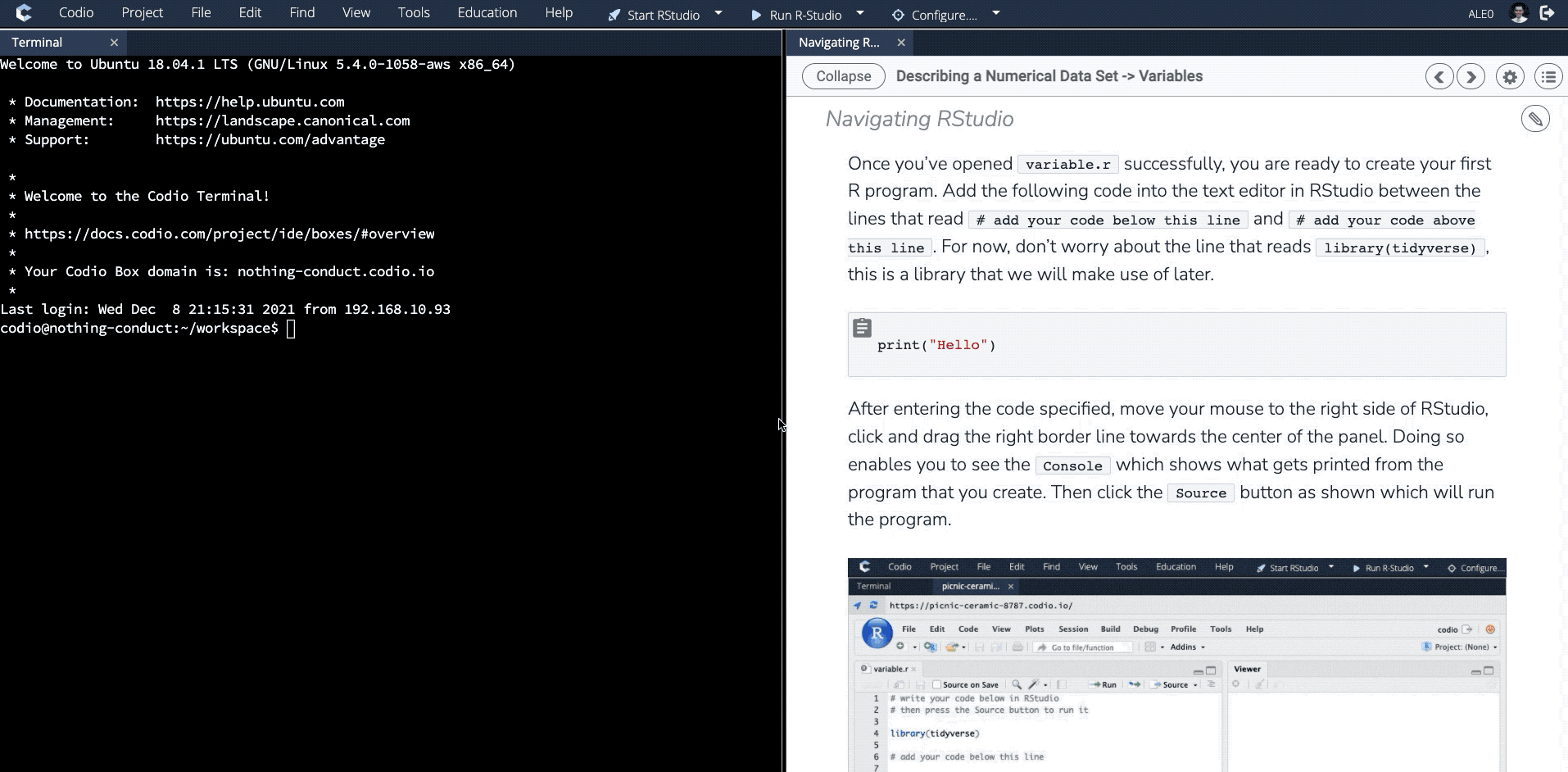
A Complete Hands-On Approach to Data Analysis
Each assignment is laid out via a step-by-step process.
No prior programming experience is needed to use our R and Python course platform. Code snippets, expected solutions, and feedback are provided every step of the way.
This makes Essential Data Science in Python & R perfect for complete beginners or those who want a quick review.
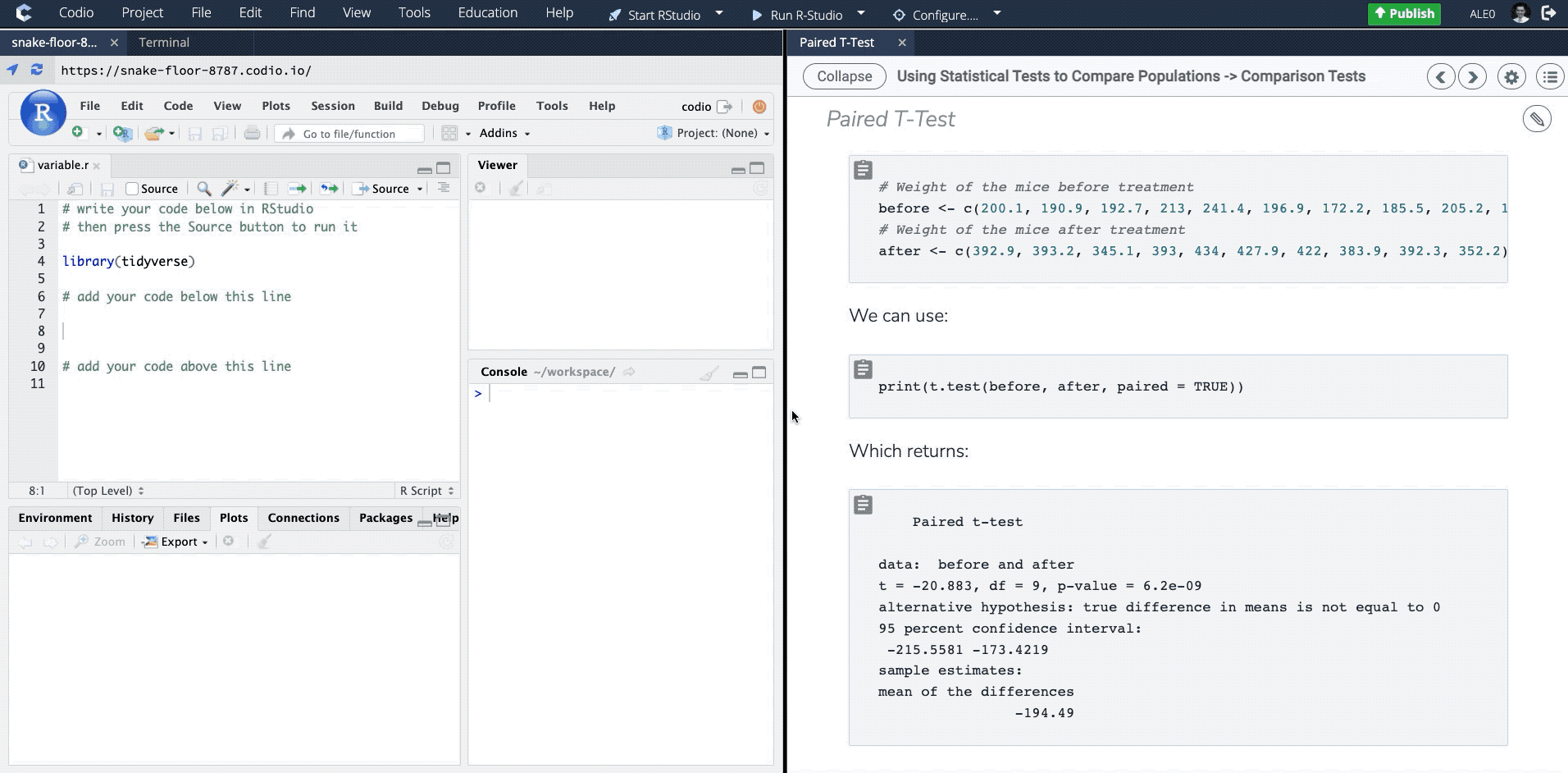
Fully Auto-Graded Assessments and Editable Content
All assessments are auto-graded and fully editable. With just a few clicks, instructors can change anything from the content itself to the assessments.
Watch how your edits change the look of the content in real-time with "Split View."
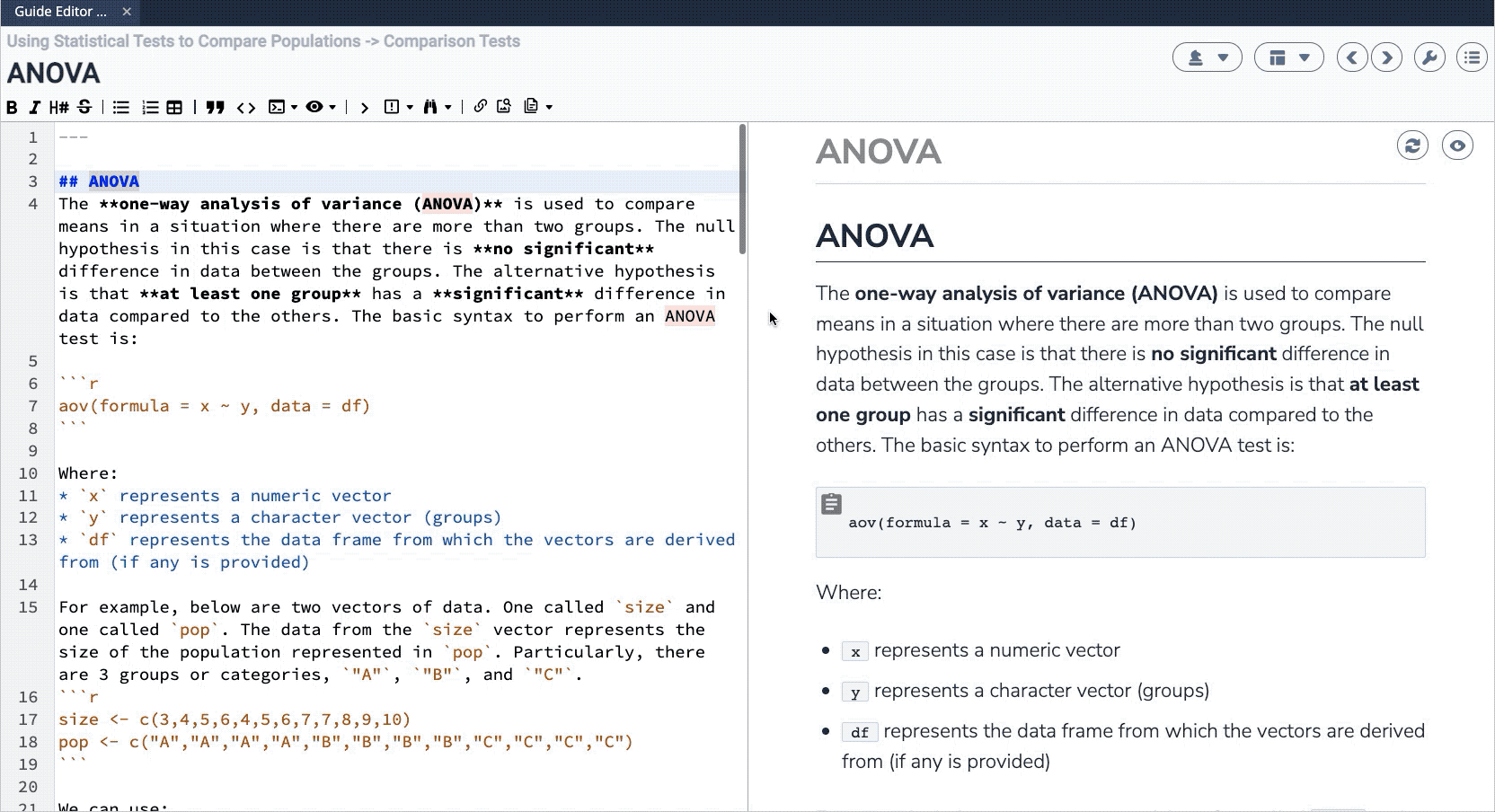
Creation of Data Visualization Models
Students learn how to showcase the data they've analyzed by creating visualization models. These models aid in helping readers understand the data better.
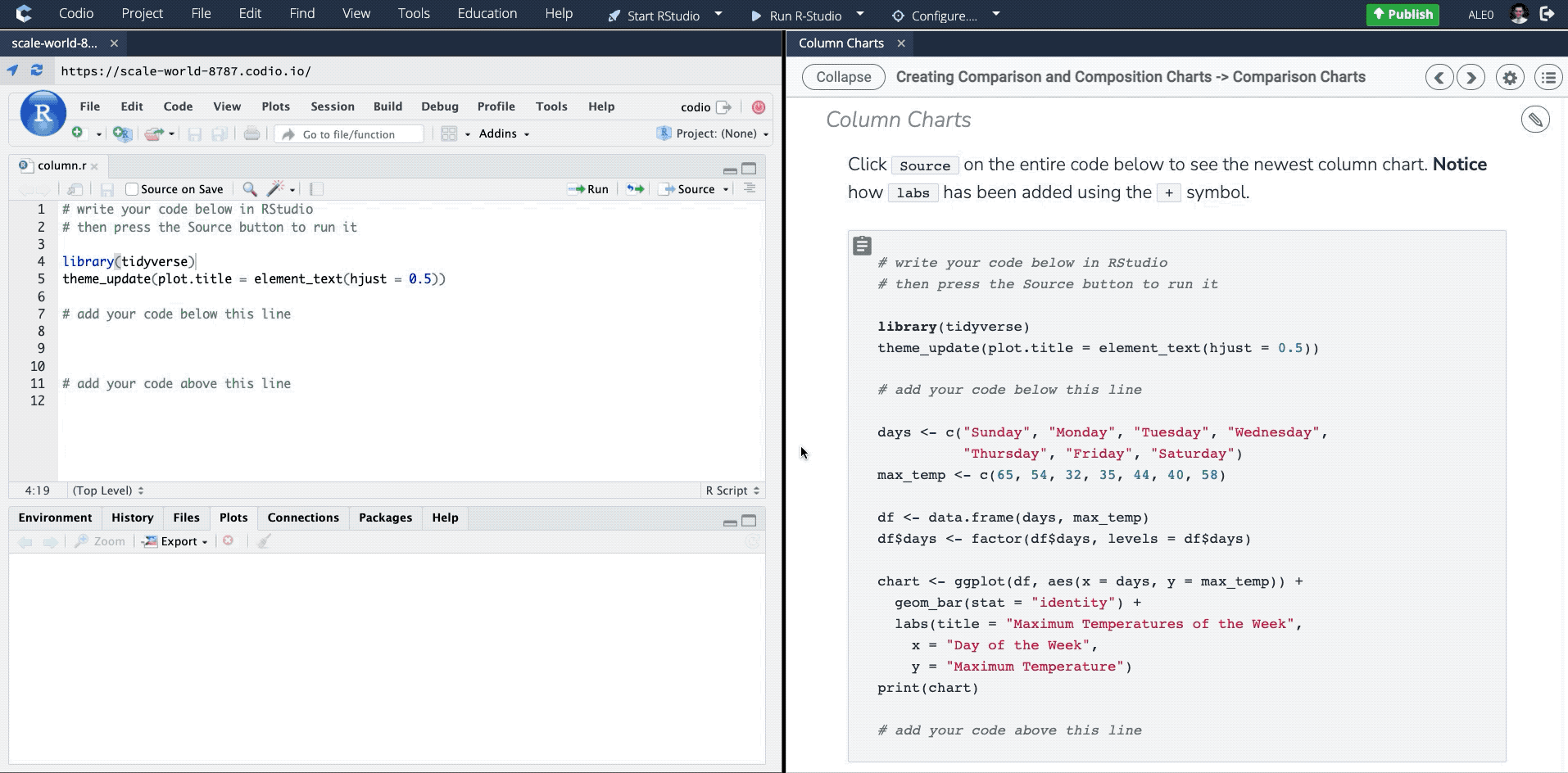
Presentation of Data Using Jupyter (Python)
Students will learn how to interact with Jupyter. Students will later use Jupyter to evaluate, explore, and present data.
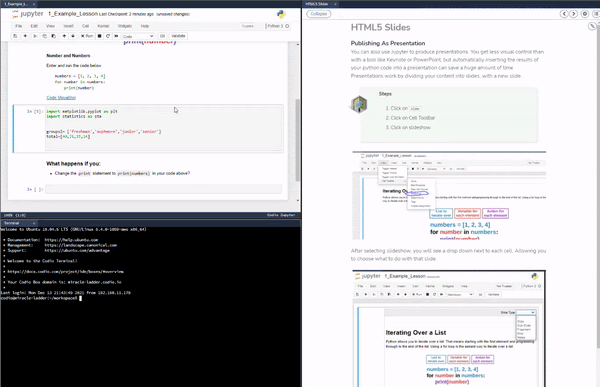
Image Similarity Algorithm
Instructors can use a simple algorithm to grade students' visualization models based on their models' similarity to the expected ones.
This powerful feature provides flexibility for instructors in their grading criteria. For example, you can change the similarity percentage to your liking to establish a stricter or more lenient grading scheme.
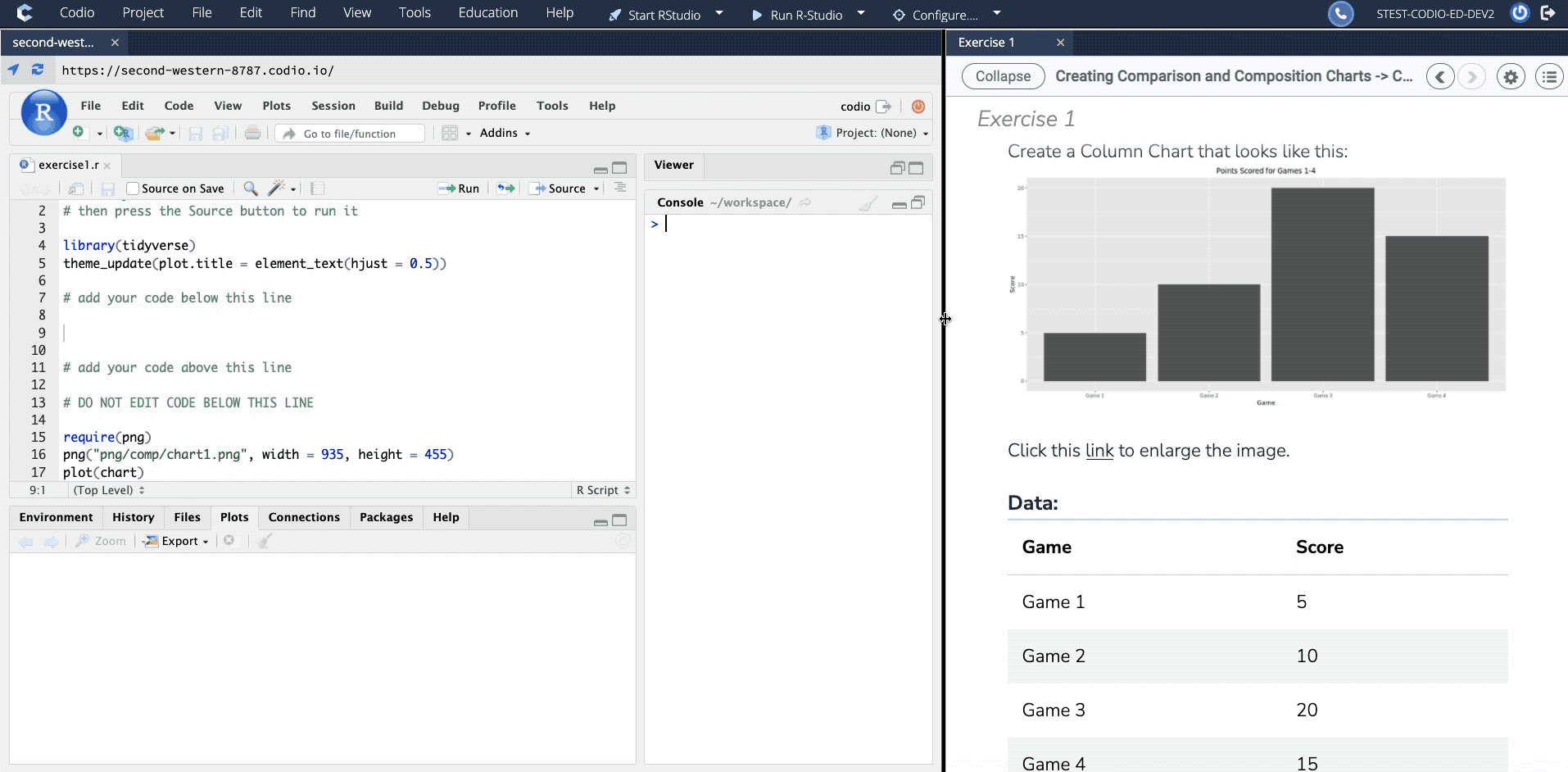
Recap - Codio’s Essential Data Science Courses
As the field of data science grows, the need for more data scientists and analysts also increases.
Codio's step-by-step and hands-on approach to learning data science makes it easier for new students to grasp core concepts. Spyder and RStudio, two of the most popular and industry-standard tools, are fully integrated within Codio. Students can access these powerful tools with just a click of a button. All lessons and assessments come with guides to lead students through each topic, in addition to rich and immediate feedback being offered throughout the process.
Codio supports professors through effective course material, rich learning insights, educational tools, and much more. Get started today: Set up your free instructor account and schedule a demo!


